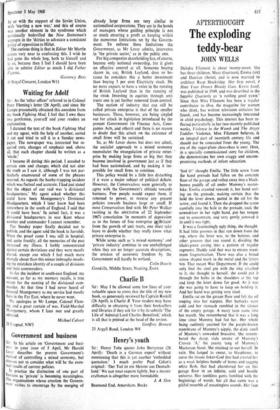Government and business
Sir: In his article on 'Government and busi- ness' in your issue of 5 April, Mr Harold Lever describes the present Government's method of controlling a mixed economy, but chooses not to consider what will be the even- tual results of current policies. In practice the distinction of one part of business as 'private' is becoming meaningless. Tbe organisations whose creation the Govern- ment wishes to encourage by the merging of already large firms are very similar to nationalised corporations. They are in the hands of managers whose guiding principle is not so much ensuring a profit as keeping within the numerous limitations set by the Govern- ment. To enforce these limitations the Government, as Mr Lever admits, intervenes in 'the private sector,' as in the public one.
For big companies shareholding has, of course, become only notional ownership, for it gives no effective control at all. Someone buying shares in, say, British Leyland, does so be- cause he considers this a better investment than buying 3 per cent Electricity stock. He no more expects to have a voice in the running of British Leyland than in the running of the CEGB. Investing in equities through unit trusts one is yet further removed from controL
The section of industry that can still be called private enterprise is that of the smaller businesses. These, however, are being singled out for attack in legislation introduced by the present Government (in Finance Acts, Com- panies Acts, and others) and there is no reason to doubt that this attack on the existence of small firms will be sustained.
So, as Mr Lever shows but does not admit, the socialist approach to a mixed economy necessitates the strangulation of private enter- prise by making large firms so big that they become involved in government just as if they had been nationalised, and by making it im- possible for small firms to continue.
This policy would be a little less disturbing if it were a major subject of political debate. However, the Conservatives seem generally to agree with the Government's attitude towards business. Few people would expect them, if returned to power, to reverse any present policies towards business large or small. If most Conservatives find with Mr Peter Walker (writing in the SPECTATOR of 22 September
1967) consolation 'in moments of depression as to the future of free enterprise ieritain' from the growth of unit trusts, one must take leave to doubt whether they really know what private enterprise is.
While terms such as 'a mixed economy' and 'private industry' continue in use unchallenged when they are no longer accurate descriptions, the erosion of economic freedom by the Government will hardly be noticed.
Colin Dauris Goodalls, Middle Street, Nazeing, Essex






































 Previous page
Previous page